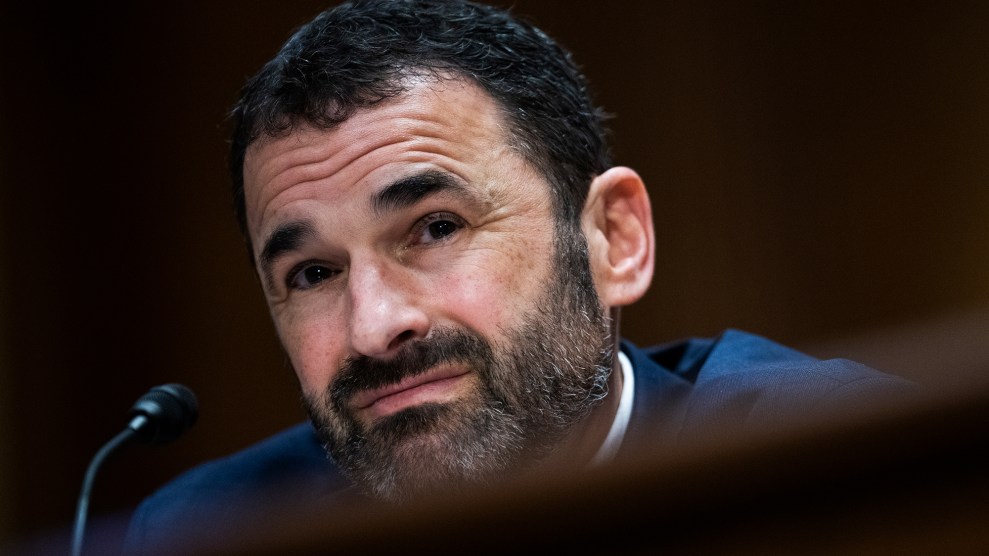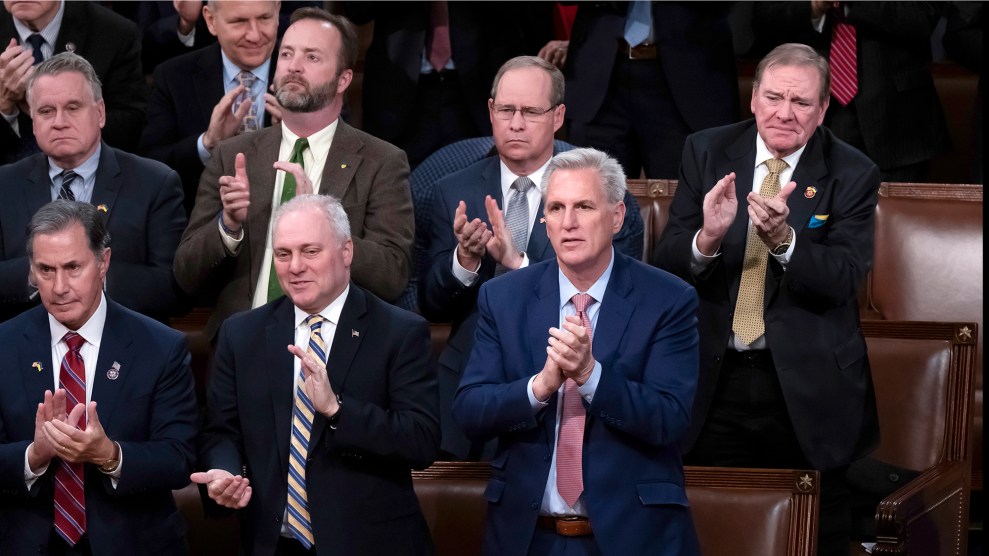
Daniel Werfel, nominee for IRS commissioner, testified Wednesday before the Senate Finance Committee.Tom Williams/CQ Roll Call/AP
Wednesday’s confirmation hearing for Daniel Werfel, President Biden’s nominee for IRS commissioner, though not nearly so contentious as it might have been, hinted at partisan battles to come over America’s most beloved federal agency.
Senate Finance Committee Chair Ron Wyden commenced the hearing by calling out America’s “two-tiered” tax system—one set of rules for most of us, another for big companies, superwealthy folks, and their complex and seldom-audited business partnerships.
Werfel pledged to tackle the agency’s audit imbalance, wherein a kneecapped IRS came to over-rely on “correspondence audits” of low and moderate earners and less on very high-earners whose tax filings tend to be exceedingly complex—often deliberately so. In 2018, for example, the IRS audited virtually zero partnerships—which include law and accounting firms, real-estate partnerships, hedge funds, private equity firms, and the like.
As I wrote in my 2021 book, Jackpot, the gutting of the agency’s enforcement budget by Republican lawmakers during the 2010s “resulted in an exodus of experienced auditors, people with the expertise required to decode the financial voodoo of the wealthiest taxpayers and their deliberately opaque partnerships. (It can ‘take months to identify the person who represents the partnership,’ IRS auditors told the Government Accountability Office in 2014.)”
The need for more IRS scrutiny of super-rich tax avoiders was among the primary reasons that the Democrats included close to $80 billion in new funding for the agency (over 10 years) in the Inflation Reduction Act. House Republicans have already voted to repeal most of that funding, more than half of which is slated for tougher tax enforcement, with the rest going to things like oversight, improved customer service, and an overhaul of the IRS’s seriously outdated tech capabilities.
Customer service, weak tech, and delays in processing returns were hot topics for senators of both parties, who get an earful from constituents about these things. In recent years, the agency’s response rates when customers call with questions has been abysmal. But so far this tax season, with the help of thousands of new customer service staffers hired with that funding the Democrats provided, the response rate is up in the range of 90 percent. (Werfel said he would “lose sleep” if even one taxpayer didn’t get a timely response.)
A top Democratic priority is to tackle the audit imbalance between rich and poor, though Werfel seemed unprepared when Wyden asked about the recent revelations that Black taxpayers are far more likely to be audited than non-Black ones. (I wrote about that here.) He promised to get back to the committee within 60 days, once he had a chance to get to the bottom of it.
Interestingly, in order to shrink the notorious gap between what rich Americans owe and what they pay in taxes, Werfel suggested engaging, well—the enemy. “I think we want to hire and bring in experts,” he told the panel, “maybe some of the same individuals that earlier in their careers prepared these very intricate returns and are ready to come back and potentially serve their country.” (They would have to take a big pay cut.)
The hearing overall was civil and surprisingly light on misinformation, though there was some of that. Republican senators mainly wanted more of the $80 billion to be used for things like better customer service and tighter data security—and they wondered how the IRS could accomplish its goals without auditing more people and small business owners who make less than $400,000 a year.
That’s a fair question. The Biden administration has promised that the new enforcement funding would only target people making more. The fact is, plenty of small businesses, especially those that deal in cash, misreport earnings to the government, adding to the tax gap. But Werfel, prompted by the Republicans’ concerns that the IRS would go after law-abiding small businesses, said he hoped to ease up scrutiny on categories of businesses and taxpayers most likely to pay what they owe honestly, and focus on areas where there’s likely to be “something underlying that’s nefarious, something that relates to advertent cheating or evasion.“
Lankford and a couple of others cited the IRS’s past targeting of conservative groups for investigations—a common GOP refrain, though the IRS was also found to have targeted liberal groups. They also were concerned about the explosive leak of IRS information to ProPublica that revealed how some of the nation’s richest people minimize their taxes. Lankford lamented that nobody had been prosecuted over the leak. “You thought you were in the fire last time you walked into the IRS? You’ve got a lot that’s on your plate this time,” Lankford told Werfel, who served a previous stint with the tax agency.
On the misinformation front, Sens. John Thune (R-S.D.) and John Barrasso (R-Wyo.), falsely claimed the agency was using its new enforcement funding to “support an army,” as Barrasso put it, of “87,000 new IRS agents.” (It’s hiring a tiny fraction of that.) And that those agents would be packing heat: “We saw the ads of what [the IRS is] looking for in terms of ability to carry weapons,” he said.
Fact-check: The only IRS agents licensed to carry are the few who participate in law-enforcement raids on money launderers, terrorist cells, drug cartels, etc—multiagency efforts like 2021’s Operation Cookout, which according to the IRS “netted 65 kilograms of illegal drugs, 24 firearms, more than $700,000 in cash and guilty pleas from 45 defendants.” Most new hires will likely consist of tax lawyers, forensic accountants, and related paper-pushers.
Barrasso and Marsha Blackburn (R-Tenn.), had their drawers in a twist over a new IRS compliance programs for tipped employees. Indeed, a who’s who of Republican lawmakers was making a stink about this on Twitter last week. “This isn’t going after millionaires and billionaires. This is going after waiters and waitresses,” Barrasso said. Blackburn echoed the sentiment, accusing the IRS of hiring new agents to “pick on” service workers.
🚨 America's service workers beware 🚨
Somebody has to pay for @JoeBiden's reckless spending and radical agenda, and Biden's IRS is making sure that person is YOU. https://t.co/TEpc1rpdhX
— Rick Scott (@SenRickScott) February 7, 2023
This is false populism. As Wyden reminded Blackburn, this program is entirely voluntary, a tool restaurants can use to ensure they are complying with existing tax law (his emphases). There’s no way it will be made mandatory, he added: “Not on my watch.”
What’s more, in March 2021, Barrasso and Blackburn voted against a Covid relief amendment that would have raised the stagnant federal minimum wage from $7.25 an hour to $15 over five years. And both senators hail from states that use that same miserly wage and an even lower “tipped minimum wage” of just $2.13 an hour for workers who earn substantial tips. Restaurant owners still have to make sure their waitstaffs get $7.25 an hour, but they get to raid the workers’ tip jars to fill the gap—not a very friendly policy for struggling service workers.
Other highlights: Sen. Sheldon Whitehouse (D-R.I.) questioned whether the IRS planned to crack down on sketchy political groups. It’s standard now, he said, for the same group to operate both a tax-exempt 501(c)(3) corporation, which cannot take part in political activities, and a 501(c)(4), which can. They “are essentially twins,” he said—same staff, same location, same donors, and “I don’t believe the IRS has ever looked to see whether the corporate veil between [them] is real, or whether you can penetrate that corporate veil with a banana, for Pete’s sake!”
Sen. Elizabeth Warren (D-Mass.) was, well, classic Warren, raging against the machine. The Massachusetts Democrat used her five minutes to accuse the GOP of rigging the tax system and running up the deficit in three steps: “Number one: Shovel tax cuts to the wealthy and the giant corporations whenever they are in charge. Number two: Slash funding at the IRS so they can’t take on rich tax cheats. Number three: Pretend to care about fiscal responsibility when there’s a Democrat in the white house, so that the Republicans can hold our economy hostage. And let’s face it, this scam has worked.“
She’s not wrong. She also wasn’t finished. Warren also talked up “the latest Republican scam, the so-called Fair Tax,” which I wrote about here. In short, some Republicans want to do away with the current federal tax system and replace it with a 30 percent national sales tax. She asked Werfel to say how sales taxes affect poor vs. rich.
Werfel, trying his best to sound nonpartisan, conceded that consumption taxes “are regressive, meaning they impact low-income [people] in a more substantial way…than a high-income taxpayer.” Warren also got him to admit that this fringe Republican proposal—which, to be fair, even a lot of conservatives don’t like—would create a “significant risk of evasion.”
Lacking Senate control, Republicans won’t be able to gut the IRS as they did in the 2010s. But they will assuredly remain the taxman’s nemesis, using whatever leverage they can to chip away at its budget once again. Apparently with this in mind, Warren made a point of blaming the current debt-ceiling crisis on the GOP’s massive 2017 tax cuts. “Republicans are going to make a lot of noise about the debt ceiling, but this is theater,” she said. “The debt ceiling crisis is entirely made up.”
Democrats, she insisted, should not give an inch.














